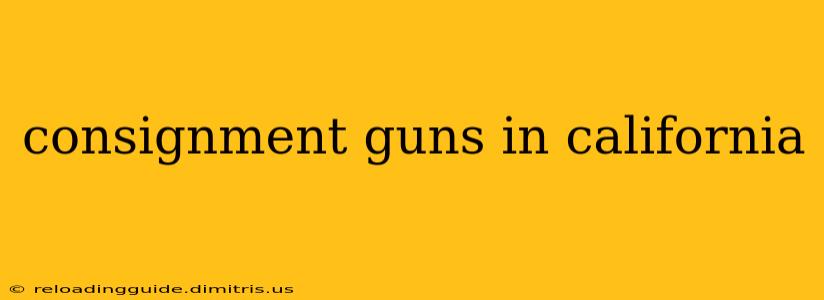California's gun laws are notoriously complex, and the process of consigning firearms adds another layer of intricacy. This guide aims to clarify the legal framework surrounding consignment guns in California, providing essential information for both sellers and buyers. We'll explore the regulations, licensing requirements, and potential pitfalls to ensure a safe and legal transaction. This information is for educational purposes only and should not be considered legal advice. Always consult with a qualified California firearms attorney before engaging in any firearm transaction.
Understanding California's Firearm Consignment Laws
California law doesn't explicitly define "firearm consignment," but the legality hinges on the actions and licensing of the involved parties. Essentially, consignment involves a licensed firearms dealer acting as an intermediary between a seller and a buyer. The dealer facilitates the sale but doesn't own the firearm. This is crucial because the dealer remains responsible for adhering to all state and federal firearm regulations.
The Role of the Licensed Firearms Dealer (FFL)
A licensed firearms dealer (FFL) plays a vital role in legal firearm consignment in California. They are responsible for:
- Verifying the seller's identity and legal right to sell the firearm. This includes confirming that the seller is not prohibited from owning or selling firearms under California law.
- Conducting a background check on all potential buyers. This is mandated by federal law and requires using the National Instant Criminal Background Check System (NICS).
- Ensuring compliance with all applicable state and federal regulations. This includes proper record-keeping, storage, and transfer procedures.
- Handling all aspects of the transaction, including the transfer of ownership, payment, and any associated paperwork.
The Seller's Responsibilities
While the FFL handles the bulk of the legal work, the seller still holds several responsibilities:
- Providing accurate information about the firearm. This includes its make, model, serial number, and any relevant documentation.
- Ensuring legal ownership of the firearm. The seller must possess legal title and the right to sell the firearm.
- Understanding the consignment agreement with the FFL. This agreement should clearly outline the terms of the sale, including the commission, duration of consignment, and dispute resolution process.
Potential Risks and Considerations
Consigning firearms in California carries certain risks:
- Liability: While the FFL handles much of the process, the seller may still face legal liability if the firearm is used in a crime or if any information provided is inaccurate.
- Lost or Stolen Firearms: The seller should be aware of the potential for loss or theft of the firearm while in the possession of the FFL. A clear agreement outlining responsibilities in such cases is essential.
- Commission Fees: FFLs charge a commission for their services, which can vary widely. It’s crucial to negotiate a fair commission rate beforehand.
Alternatives to Consignment
If you're looking to sell a firearm in California, consignment isn't the only option. You can also:
- Sell privately (with restrictions): California law allows for private party transfers, but these must go through an FFL and involve background checks.
- Sell directly to an FFL: This often offers a quicker and potentially more straightforward sales process.
Conclusion: Navigating the Complexities of California Gun Laws
Successfully consigning firearms in California necessitates careful planning and adherence to all applicable laws. Working with a reputable and knowledgeable FFL is paramount. Remember, this information is for general guidance only and does not constitute legal advice. Consulting a qualified firearms attorney is always recommended before undertaking any firearm transaction in California. The complexities of California's firearm regulations underscore the importance of proceeding with caution and thorough understanding to ensure a safe and legal transaction.

